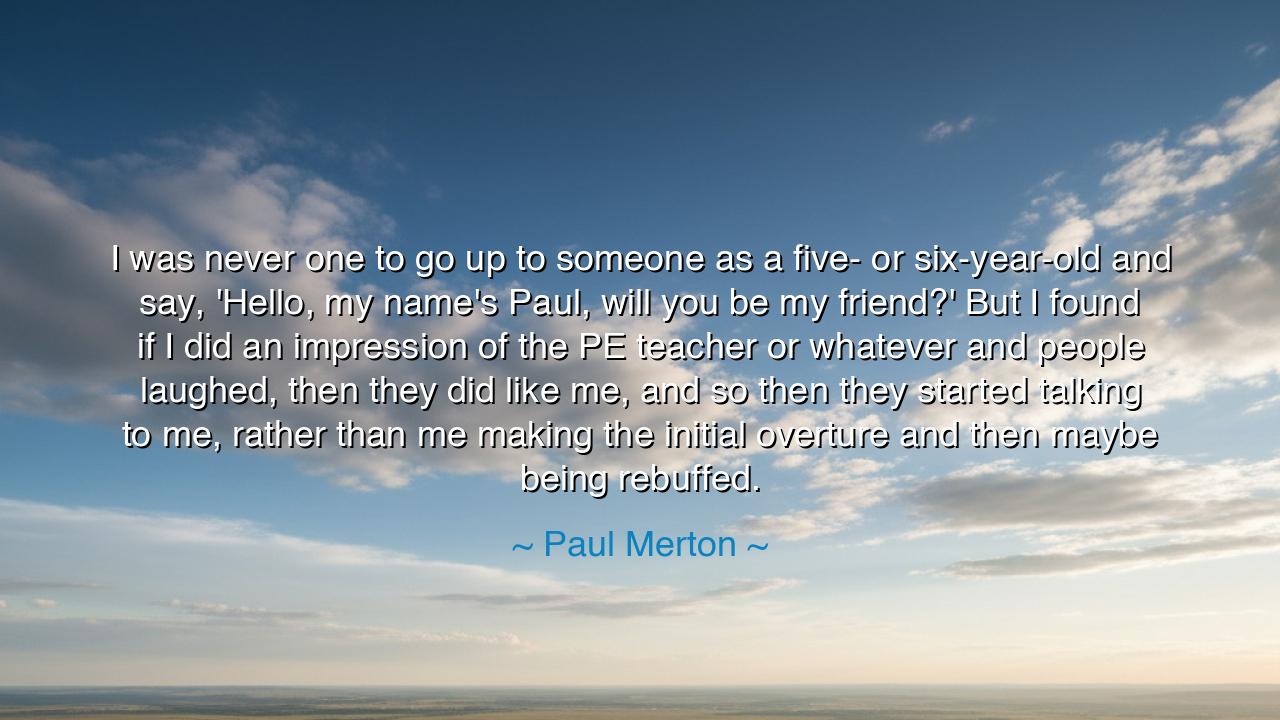
I was never one to go up to someone as a five- or six-year-old
I was never one to go up to someone as a five- or six-year-old and say, 'Hello, my name's Paul, will you be my friend?' But I found if I did an impression of the PE teacher or whatever and people laughed, then they did like me, and so then they started talking to me, rather than me making the initial overture and then maybe being rebuffed.






Hear the words of Paul Merton, who in humility remembered his youth: “I was never one to go up to someone as a five- or six-year-old and say, ‘Hello, my name’s Paul, will you be my friend.’ But I found if I did an impression of the PE teacher or whatever and people laughed, then they did like me, and so then they started talking to me, rather than me making the initial overture and then maybe being rebuffed.” This is not a trivial tale of childhood, but a revelation about the ways in which the human soul seeks connection, and how humor, performance, and creativity can become bridges where shyness might otherwise build walls.
In this saying, we hear of a boy who feared rejection, who could not boldly step forward to say, “Be my friend.” Yet he found another way—through laughter, through the spark of impressions. Where directness might have left him vulnerable, humor became his shield and his invitation. By mimicking the PE teacher and stirring joy in others, he transformed the awkward silence of childhood into the music of companionship. Thus even at so young an age, Merton discovered what many never learn: that the arts of wit and play can open doors where words of formality may falter.
The ancients knew the power of laughter. In the plays of Aristophanes, comedy was not only entertainment but a way to bring citizens together, to soften tension, to reveal truth through joy. Soldiers, politicians, and common folk all found unity in laughter, which bridged divides that argument could not. Just as Paul Merton as a child drew others near by imitating the familiar figures of school, so did Aristophanes draw Athens together by holding up a mirror, showing them their own follies in the safety of humor.
And consider the tale of Democritus, the philosopher of Abdera, known as the “laughing philosopher.” While others grew bitter at the strife of mankind, Democritus laughed—not in cruelty, but in wisdom. His laughter was a reminder that to endure life, one must sometimes find joy in its absurdities. Paul Merton’s childhood discovery lies in this same lineage: that to laugh and to cause laughter is to break the chains of isolation, to create fellowship, and to turn fear of rejection into shared humanity.
The meaning of the saying is therefore twofold. First, it reveals the vulnerability of childhood, where the hunger for friends is shadowed by the fear of rebuff. Second, it reveals the genius of humor as a tool of connection. Merton’s discovery shows us that laughter is not mere amusement; it is a language, a gift, a form of courage. To make others laugh is to risk vulnerability in a new way, but one that can draw people closer without demanding of them a direct pledge of friendship.
From this truth flows a lesson: every soul must find its bridge to others. For some, it is boldness; for others, kindness; for others still, the gift of humor or art. Do not despair if you cannot approach others with simple words—there are many ways to say, “Will you walk beside me?” What matters is that you find the path that is true to your nature, and that you use it not for manipulation, but for the building of genuine connection.
Practical action is clear: seek to bring laughter, kindness, or light to others, especially in moments of tension or loneliness. If you feel shy, let your creativity be your introduction. If you fear rejection, let your gift—whether of humor, song, or story—speak for you. And when you encounter others who reach out in this way, honor them, for behind the laughter there may be a child’s old fear of being turned away.
So let Paul Merton’s words endure: “I found if I did an impression, people laughed, and then they liked me.” This is no small confession, but a reminder that humor is a sacred bond, one that can transform fear into friendship, silence into song, and loneliness into community. Carry this wisdom, O listener, and let your gifts—whether bold or quiet—become the bridge by which you find and give belonging.






AAdministratorAdministrator
Welcome, honored guests. Please leave a comment, we will respond soon